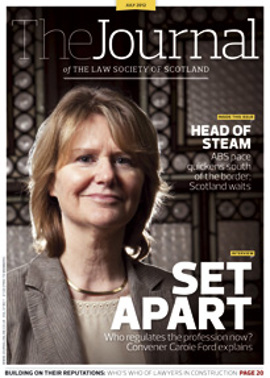President's column
When I go to speak at our law schools, there are always some students who can’t wait to get a gown on and hightail it to court to start litigating, debating… winning. I spent the first few years of my career as a court assistant and did many hundreds of appearances, contesting all the way.
If you do a vox pop in the street, and ask “What does a lawyer do?”, more often than not you will get an answer that lawyers represent people in court. The classic image is the wig and gown in a formal court setting. The TV drama Silk is predicated on fighting to win, usually at all costs.
But as solicitors know, the vast bulk of legal work (a) never goes near a court, (b) is designed to avoid going to court, and/or (c) is nothing to do with contesting or going to court.
Indeed, even where litigation is concerned, it is a signal of failure if parties end up before the bench, as it means the attempts to solve the problem at various preliminary stages have not succeeded. Not that this necessarily means the lawyers have done anything other than a good job. Some clients and some issues just need that day/week/month in court.
Litigation should be a matter of subsidiarity. Try to solve the issue at the cheapest, most informal stage. Ideally, this means advising a client not to proceed with an unsound case, corresponding positively and co-operatively with an opposing solicitor, looking for the compromise lurking among the vitriol. And applying lots of other professional and personal skills.
Mainstream approach
Alternative dispute resolution is the thing – no longer a buzzphrase or a new approach. It is incredibly important to have ADR tattooed across your forehead for the client to see every time they come to consult you. I have lost count of the clients who have gone to court, and win or lose, come away completely frustrated and disappointed by the whole experience.
Being a solicitor is rarely just about knowing the law. If I had to give up the job, I could re-qualify as a psychologist pretty easily, as the principles are of great use in dealing with one’s own client and with opposing parties and agents (and with sheriffs and judges, but don’t tell them that).
A good client will understand that compromise and co-operation are more likely to overcome a legal obstacle than (just) shouting and fighting. A difficult client will assume that you’re on the other party’s side or not up to the job. But an important part of any case is to lay out the options, the risk, and your advice on strategy. Often that is, or ought to be, arbitration, mediation or something similar.
The Scottish Arbitration Centre is a great asset in dispute resolution. As part of its development, it has launched an individual and corporate membership scheme. Aside from advertising on its website, members will receive discounted rates for SAC events or room hire. I am delighted that a number of legal firms have already signed up, and hope many more will do so, as it is crucial we support the Centre in its promotion of arbitration and Scotland as a place to arbitrate. Being agents of the successful process will inevitably lead to significant benefits, particularly in attracting international business.
If it is about winning, then so often the victory is in two warring commercial parties coming away from a dispute with fences beginning to be mended, and a future rather than a past. At very least it may be simply avoiding a litigatory bloodbath and a thoroughly disgruntled client. Part of my self-appointed job as President is to increase the public’s understanding of what we as solicitors do. Arbitration and ADR are great examples of our adding value and acting in clients’ best interests.
Festival time
In that very task, we are throwing the net wider, to the general public and our lawmakers. In this year’s Festival of Politics, the Society is running a debate entitled “Making the law work for you – how would you improve the justice system?” This free event takes place on Friday 24 August, 1-2pm, in committee room 1 of the Scottish Parliament. I will be chairing, with panellists Brandon Malone of the SAC, John Scott QC of Capital Defence Lawyers, Mark Thorley from the Society’s civil legal aid team, and Susan McPhee from Citizens Advice Scotland, discussing mediation and arbitration, improving our system of human rights, the benefits of legal aid, and making the law “less legal”. I have had the privilege of doing my Jeremy Paxman for the last couple of years at the event. This year the audience will take part in a live vote of the issues raised and I am really looking forward to it. Do try to come along – or even send that difficult client.
In this issue
- On your marks
- Many's a crowd
- Family migration
- Assessing internet sex offenders
- Division and sale - disposal inter se
- Reading for pleasure
- Opinion column: Elaine Motion
- Council profile
- Book reviews
- President's column
- Into the front line
- A few more bricks
- Eye on the profession
- One eye over the border
- Who's who in construction
- Speed up child cases
- Take another look
- Relief on the review front
- Waste not
- Scottish Solicitors' Discipline Tribunal
- Financial services regulation: the race to reform
- Leases: where next?
- A wake-up call?
- Law reform roundup
- From the Brussels office
- Update: Registered Paralegal Scheme
- Business checklist
- Ask the experts
- Ask Ash






